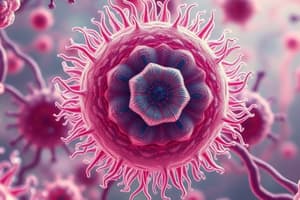Podcast
Questions and Answers
Who first used the term 'cell' to describe the basic units of life?
Who first used the term 'cell' to describe the basic units of life?
- Theodor Schwann
- Robert Hooke (correct)
- Matthias Schleiden
- Rudolf Virchow
What does cell theory state about all living organisms?
What does cell theory state about all living organisms?
- All organisms are made of one or more cells. (correct)
- All life functions of organisms occur outside cells.
- All organisms are made of several types of cells.
- All cells are composed of membrane-bound organelles.
Which of the following is NOT a characteristic of prokaryotic cells?
Which of the following is NOT a characteristic of prokaryotic cells?
- Presence of a nucleus (correct)
- Lack of membrane-bound organelles
- Small size (1-5 µm)
- Binary fission as a mode of division
What is the primary mode of division for prokaryotic cells?
What is the primary mode of division for prokaryotic cells?
Which type of organism is characterized by the absence of a membrane-bound nucleus?
Which type of organism is characterized by the absence of a membrane-bound nucleus?
Which of the following organisms is classified as prokaryotic?
Which of the following organisms is classified as prokaryotic?
What distinguishes unicellular organisms from multicellular organisms?
What distinguishes unicellular organisms from multicellular organisms?
Which characteristic is NOT shared by all living organisms?
Which characteristic is NOT shared by all living organisms?
What distinguishes eukaryotic cells from prokaryotic cells?
What distinguishes eukaryotic cells from prokaryotic cells?
How do human cells primarily divide?
How do human cells primarily divide?
What role do tissues play in the human body?
What role do tissues play in the human body?
Which type of cell is NOT typically found in the human body?
Which type of cell is NOT typically found in the human body?
What is the estimated number of different cell types present in an adult human?
What is the estimated number of different cell types present in an adult human?
Which of the following best describes eukaryotic cells?
Which of the following best describes eukaryotic cells?
What is the smallest structural and functional unit of an organism?
What is the smallest structural and functional unit of an organism?
Flashcards
Cell Theory
Cell Theory
A fundamental theory in biology stating that all organisms are made of one or more cells, all life functions occur within cells, and all cells come from pre-existing cells.
Unicellular Organism
Unicellular Organism
An organism composed of a single cell that performs all life functions within that cell, such as a bacterium or yeast.
Multicellular Organism
Multicellular Organism
An organism composed of many different cells that work together, performing various specialized functions.
Prokaryotic Cell
Prokaryotic Cell
Signup and view all the flashcards
Prokaryotic Cell Characteristics
Prokaryotic Cell Characteristics
Signup and view all the flashcards
Cell
Cell
Signup and view all the flashcards
Robert Hooke
Robert Hooke
Signup and view all the flashcards
Cell Theory Scientists
Cell Theory Scientists
Signup and view all the flashcards
Levels of Organization
Levels of Organization
Signup and view all the flashcards
Tissue
Tissue
Signup and view all the flashcards
Organ
Organ
Signup and view all the flashcards
Organ System
Organ System
Signup and view all the flashcards
Stem Cell
Stem Cell
Signup and view all the flashcards
Cell Function
Cell Function
Signup and view all the flashcards
Study Notes
Medical Biology/Cytology
- Biology is the study of living things and their environments
- A cell is the basic unit of all living things
- Cell theory: All organisms are made of one or more cells; all life functions occur within cells; all cells come from pre-existing cells
- Cells are classified by the presence or absence of a nucleus
- Prokaryotic cells: Lack a true nucleus, small size (1-5 µm), have a cell wall, lack a nuclear envelope, no organelles except ribosomes, divide by binary fission. Examples include bacteria and archaea
- Eukaryotic cells: Contain a nucleus and organelles, larger than prokaryotic cells (10-100 µm), have a distinct nucleus, histones associated with genetic material, numerous membrane-bound organelles, divide by mitosis and meiosis. Examples include protozoa, fungi, plants, and animals
- Humans are eukaryotic, multicellular organisms with cell, tissue, organ, and organ system organization levels
- Human cells are diverse, with ~200 different types (e.g., muscle cells, bone cells, blood cells)
- Cells are microscopic, visible with electron microscopes; each cell plays a distinctive role in the body
- Cells are composed of plasma membrane, cytoplasm, nucleus, and cytoskeleton.
- Cytoplasm (cytosol, organelles, and inclusions) contains the four fundamental molecules (proteins, carbohydrates, lipids, and nucleic acids) vital for life
Studying That Suits You
Use AI to generate personalized quizzes and flashcards to suit your learning preferences.




